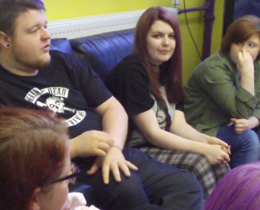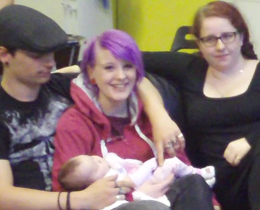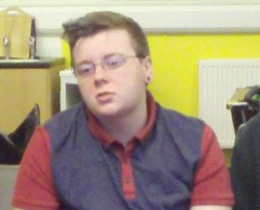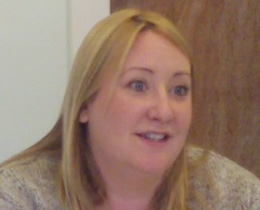Clyde Pride LGBT Youth Group, Inverclyde
How to use this exemplar to improve practice
You are invited to read the article and consider, individually or as a team, the following improvement questions:
- In your setting, in what ways do services engage with vulnerable young people? What opportunities are offered to them? What is your involvement in this?
- How well are you linking with CLD partners or other organisations who are working with the same group of young people?
- How is your practice contributing to the national youth work outcomes for Scotland?
- How is your practice helping young people to recognise and realise their rights?
Explore this exemplar
 Clyde Pride youth group was highlighted as an example of 'sector leading' community learning and development (CLD) practice during the HMI inspection of the Clydeview Academy learning community in March 2015. Inspectors noted that:
Clyde Pride youth group was highlighted as an example of 'sector leading' community learning and development (CLD) practice during the HMI inspection of the Clydeview Academy learning community in March 2015. Inspectors noted that:
‘Lesbian, Gay, Bi-sexual and Transgender (LGBT) young people are being empowered to change attitudes and implement change. They are strongly committed to challenging stereotypes, for example through work with Police Scotland to train new recruits at Tulliallan. LGBT young people are now more respected and represented. This is sector leading.’
What was done?
 Clyde Pride has been running for around three years and has more than 20 regular members, aged between 12 and 25 years, who meet on a weekly basis in Greenock. The group provides a supportive and non-judgemental environment for local LGBT young people to socialise, helping them to feel more comfortable with their sexuality and gender identity.
Clyde Pride has been running for around three years and has more than 20 regular members, aged between 12 and 25 years, who meet on a weekly basis in Greenock. The group provides a supportive and non-judgemental environment for local LGBT young people to socialise, helping them to feel more comfortable with their sexuality and gender identity.
The group also works on issues that matter to members and is strongly committed to campaigning for social change.
The group decides what it works on, based on issues that the members themselves feel passionate about. Some of its recent areas of work have included:
- An online campaign to try to change some of the restrictions on blood donation in the UK so that anyone who wishes to donate blood is treated equally and fairly regardless of gender, race or sexuality.
- Working with the Police Scotland training college at Tulliallan to raise awareness of LGBT issues with new police recruits.
- Establishing an annual LGBT Gay Pride Walk - a first for Inverclyde.
In the past year, the group has also established 'Transpire', which is a spin-off group specifically for transgender members. Members of this group have also been working on projects including:
- 'Transpire Attire' - a clothes swap shop for group members
- A campaign to raise awareness of the need for gender neutral toilets in public buildings.
What was the impact?
 Young people in the group feel less socially isolated than they did and are being empowered to challenge stereotypes and change attitudes about LGBT issues, both locally and nationally. As a result of the work of the group, LGBT young people are now more respected and represented in Inverclyde.
Young people in the group feel less socially isolated than they did and are being empowered to challenge stereotypes and change attitudes about LGBT issues, both locally and nationally. As a result of the work of the group, LGBT young people are now more respected and represented in Inverclyde.
One of the young people who helped to start the group said that,
'Three years ago, the nearest LGBT group was 26 miles away in Glasgow and younger people down here just weren't going to go there, so me and many others in the area felt it was a priority to do something. Three years on we've done tons of work on many different things. Now we're really well known because we're fabulous and we have some really innovative people in the group.'
Another group member said that advertising the group was a concern at first:
'We worried - would people be outed or would it cause animosity? After a while we realised that it wasn't such a big issue. Our confidence has grown. We try to protect members who feel they need protecting but we also try to help everyone feel more confident about just being who they are.'
A third group member summed up what was important to them:
'I think the main thing about the group is that we support each other. Especially the new members - we try to be really supportive of them. We accept each other where we're at – every single one of us. We’re all there for each other.'
The role of CLD workers
 The group is supported by the CLD team at Inverclyde Council. At the time of our visit in 2015, CLD Worker Aileen Wilson supported the group, along with several volunteer youth workers and other colleagues.
The group is supported by the CLD team at Inverclyde Council. At the time of our visit in 2015, CLD Worker Aileen Wilson supported the group, along with several volunteer youth workers and other colleagues.
The workers involved are building positive relationships with young people; helping the group to plan and implement learning and development activities; engaging in critical dialogue with young people; and promoting young people’s rights.
Aileen said that, 'My responsibility is making sure everyone is involved in things, facilitating what they want to do, and to keep the group motivated. Young people are in the group because they want an active role in LGBT issues. They also want to have fun.
'An LGBT group is different from other youth groups in some ways because there can be a lot more emotion involved. A lot of the group have been through bullying; some are maybe not accepted at home. They’re telling you about their sexuality, or their gender identity, and you have to give a little back so that they can trust you to talk about those things – and that you’re not judgemental.'
Key strengths of the project
- Effective use of CLD and youth work approaches
- Engaging potentially vulnerable and isolated young people effectively
- Building young people’s confidence and resilience
- Empowering young people to change attitudes and implement social change
- Making a positive impact on the local community
Contact
To find out more, please contact: Hugh Scott, Team Leader - Youth Work and Health, Community Learning and Development, Inverclyde Council.
Phone: 01475 715450
Email:
hugh.scott@inverclyde.gov.uk
